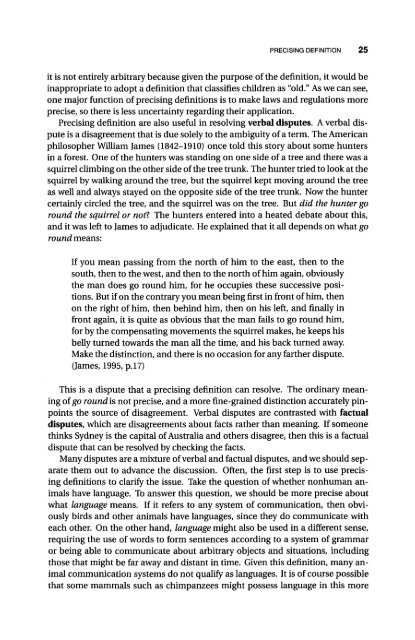An Introduction to Critical Thinking and Creativity - always yours
An Introduction to Critical Thinking and Creativity - always yours
An Introduction to Critical Thinking and Creativity - always yours
You also want an ePaper? Increase the reach of your titles
YUMPU automatically turns print PDFs into web optimized ePapers that Google loves.
PRECISING DEFINITION 25<br />
it is not entirely arbitrary because given the purpose of the definition, it would be<br />
inappropriate <strong>to</strong> adopt a definition that classifies children as "old." As we can see,<br />
one major function of precising definitions is <strong>to</strong> make laws <strong>and</strong> regulations more<br />
precise, so there is less uncertainty regarding their application.<br />
Precising definition are also useful in resolving verbal disputes. A verbal dispute<br />
is a disagreement that is due solely <strong>to</strong> the ambiguity of a term. The American<br />
philosopher William James (1842-1910) once <strong>to</strong>ld this s<strong>to</strong>ry about some hunters<br />
in a forest. One of the hunters was st<strong>and</strong>ing on one side of a tree <strong>and</strong> there was a<br />
squirrel climbing on the other side of the tree trunk. The hunter tried <strong>to</strong> look at the<br />
squirrel by walking around the tree, but the squirrel kept moving around the tree<br />
as well <strong>and</strong> <strong>always</strong> stayed on the opposite side of the tree trunk. Now the hunter<br />
certainly circled the tree, <strong>and</strong> the squirrel was on the tree. But did the hunter go<br />
round the squirrel or not 7 . The hunters entered in<strong>to</strong> a heated debate about this,<br />
<strong>and</strong> it was left <strong>to</strong> James <strong>to</strong> adjudicate. He explained that it all depends on what go<br />
round means:<br />
If you mean passing from the north of him <strong>to</strong> the east, then <strong>to</strong> the<br />
south, then <strong>to</strong> the west, <strong>and</strong> then <strong>to</strong> the north of him again, obviously<br />
the man does go round him, for he occupies these successive positions.<br />
But if on the contrary you mean being first in front of him, then<br />
on the right of him, then behind him, then on his left, <strong>and</strong> finally in<br />
front again, it is quite as obvious that the man fails <strong>to</strong> go round him,<br />
for by the compensating movements the squirrel makes, he keeps his<br />
belly turned <strong>to</strong>wards the man all the time, <strong>and</strong> his back turned away.<br />
Make the distinction, <strong>and</strong> there is no occasion for any farther dispute.<br />
(James, 1995, p. 17)<br />
This is a dispute that a precising definition can resolve. The ordinary meaning<br />
of go round is not precise, <strong>and</strong> a more fine-grained distinction accurately pinpoints<br />
the source of disagreement. Verbal disputes are contrasted with factual<br />
disputes, which are disagreements about facts rather than meaning. If someone<br />
thinks Sydney is the capital of Australia <strong>and</strong> others disagree, then this is a factual<br />
dispute that can be resolved by checking the facts.<br />
Many disputes are a mixture of verbal <strong>and</strong> factual disputes, <strong>and</strong> we should separate<br />
them out <strong>to</strong> advance the discussion. Often, the first step is <strong>to</strong> use precising<br />
definitions <strong>to</strong> clarify the issue. Take the question of whether nonhuman animals<br />
have language. To answer this question, we should be more precise about<br />
what language means. If it refers <strong>to</strong> any system of communication, then obviously<br />
birds <strong>and</strong> other animals have languages, since they do communicate with<br />
each other. On the other h<strong>and</strong>, language might also be used in a different sense,<br />
requiring the use of words <strong>to</strong> form sentences according <strong>to</strong> a system of grammar<br />
or being able <strong>to</strong> communicate about arbitrary objects <strong>and</strong> situations, including<br />
those that might be far away <strong>and</strong> distant in time. Given this definition, many animal<br />
communication systems do not qualify as languages. It is of course possible<br />
that some mammals such as chimpanzees might possess language in this more
















